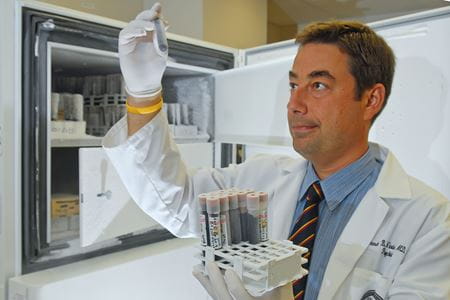INDIANAPOLIS—Researchers at Indiana University School of Medicine are studying new ways to predict suicidality. The team recently published findings about the effectiveness of a new risk assessment tool in the Springer Nature journal Discover Mental Health.
“One person dies by suicide every 40 seconds worldwide, but suicides are preventable tragedies,” said Alexander Niculescu, MD, PhD, professor of psychiatry at IU School of Medicine Department of psychiatry and lead author of the study. “This study shows our tool is highly predictive at identifying who is at risk and what can be done to decrease risk in a personalized way.”
The assessment tool was first used in the Sidney & Lois Eskenazi Hospital Emergency Department in Indianapolis four years ago on over 400 patients. The assessment is called Convergent Functional Information for Suicidality (CFI-S). It can be taken on paper or in a digital format and is a simple 22 item yes/no questionnaire focusing on psycho-social risk factors rather than biological markers, as some of the other studies Niculescu and his group had done. Unlike current clinical screenings, CFI-S does not ask about suicidal ideation and generates a quantitative risk score.
“Patients do not always want to answer questions specifically about suicidal ideation, because they may be afraid of being hospitalized,” Niculescu said. “Because this tool leaves out those questions, it is easier to deploy in any setting and can be a complementary questionnaire to use with current standard clinical screenings.”
Researchers found that at a four-year follow-up, the CFI-S tool was 80 percent predictive of future suicidality. The predictive ability increased to 90 percent when using artificial intelligence and machine-learning approaches in collaboration with colleagues at University of Southern California. The study found top risk factors for suicide were feeling useless or unneeded, a history of suicidality and social isolation.
“That is exciting, since many of these risk factors are addressable and correctable,” said Niculescu. “We now have validated a simple quantitative tool that can identify and track risk and help providers develop a personalized suicidality risk mitigation plan for their patients. Widespread use of CFI-S for screening purposes can be a gamechanger in suicide prevention efforts worldwide.”
Other study investigators include Kyle Roseberry, MD, Yena Choi, MD, Laura Quast, MD, Madelynn Gaines, and George Sandusky, PhD from IU School of Medicine; Jeffery Kline, MD from Wayne State University; and Mingxi Cheng and Paul Bogdan, PhD from University of Southern California.
###
IU School of Medicine is the largest medical school in the U.S. and is annually ranked among the top medical schools in the nation by U.S. News & World Report. The school offers high-quality medical education, access to leading medical research and rich campus life in nine Indiana cities, including rural and urban locations consistently recognized for livability.




